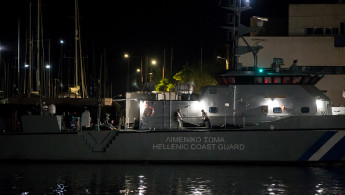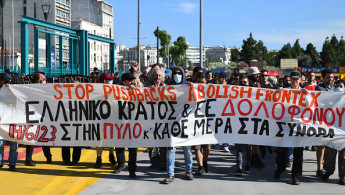EU opens probe into 'Frontex role' in Pylos boat disaster
The European Union has opened a probe into the actions of EU border security Frontex during June's Pylos boat disaster in which up to 600 people died off the coast of Greece.
Emily O’Reilly, the EU’s chief investigator, has pledged to ascertain "who is responsible for the deaths" of hundreds of Syrian, Egyptian, Palestinian and Pakistani passengers - many of whom were women and children.
"While the Greek authorities' role is being investigated at the national level, Frontex’s role in search and rescue operation also needs to be clarified," she said in a statement on Thursday.
"It has been reported that in this instance Frontex alerted the Greek authorities to the ship’s presence and offered assistance but it is not clear what else it could or should have done."
The doomed ship had been at sea for several days after setting off from Tobruk in Libya, before it capsized while stationary in calm waters 50 miles off the coast of Greece.
Frontex were informed of distress calls from the boat several hours before the boat capsize, and international investigations have found the coast guard were present as the boat capsized.
The avoidable tragedy was one of the worst disasters to happen off the coast of Europe since 2015.
Just 104 passengers were rescued. So far, 82 bodies have been recovered, while more than 500 migrants - including about 100 children - remain missing.
"A tragedy of this magnitude requires all those involved to reflect on their responsibilities," said O’Reilly.
We have opened an inquiry to clarify @Frontex role in search and rescue sea operations following the drowning of over 500 people off the Greek coast on 14 June.
— European Ombudsman (@EUombudsman) July 26, 2023
📌 https://t.co/xsbhJc7Fec
🧵 pic.twitter.com/LujQm2DZOg
Frontex has been repeatedly implicated in push-backs and alleged cover-ups over shipwrecks and mishandling personal information from migrants they detain after crossing the Mediterranean.
Greece has already opened its own investigation into the actions of the Hellenic Coast Guard, though no individuals have been arrested or suspended, despite numerous allegations of wrongdoing and cover-ups.
"Migration to Europe will continue and it is up to the EU to ensure that it acts in a way that maintains fundamental rights and does not lose sight of the human suffering that compels people to seek a better life beyond their home countries," said Emily O’Reilly.





 Follow the Middle East's top stories in English at The New Arab on Google News
Follow the Middle East's top stories in English at The New Arab on Google News
![A group of Palestinians, foreign and Israeli activists gather to participated in an olive picking event on the land in the town of Battir, which is under threat of confiscation by Israel in Bethlehem, occupied West Bank on 8 November 2024. [Getty]](/sites/default/files/styles/image_330x185/public/2182930803.jpeg?h=199d8c1f&itok=__0LgGsa)

![People gathered around the rubble of destroyed houses to search for survivors [Getty]](/sites/default/files/styles/image_330x185/public/2024-11/GettyImages-2184733820.jpg?h=199d8c1f&itok=NiM1LO2f)